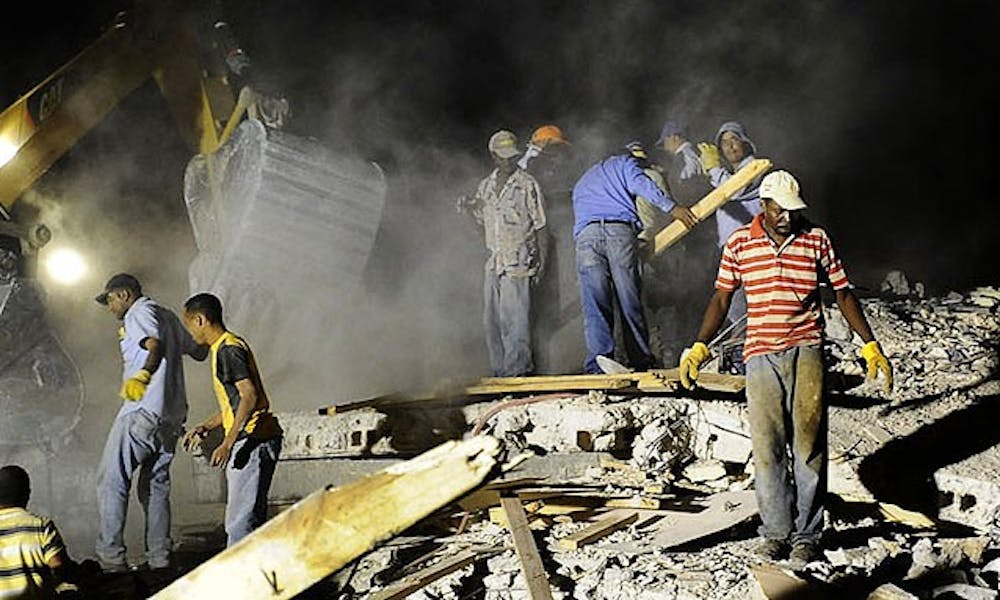Duke administrators, faculty and students are rallying to provide support and aid to victims of a violent earthquake in Haiti.
The quake, which measured 7.0 on the Richter Scale, shook the capital city of Port-au-Prince and the surrounding area Tuesday at approximately 4:53 p.m. local time, leaving almost the entire city in ruins and the city’s nearly 2 million residents without access to food, water or shelter.
“The international response to this disaster has been encouraging and inspiring, as has the immediate action on the part of the Duke community,” President Richard Brodhead and Dr. Victor Dzau, chancellor for health affairs and president and chief executive officer of the Duke University Health System, wrote in an e-mail to the Duke community Thursday evening. “Now we ask you to support the people of Haiti as they rebuild their country and to look for ways in which Duke can make a difference in the lives of people who have lost so much.”
Vice President for Student Affairs Larry Moneta said the University is forming a steering committee comprised of major stakeholders, including Duke University Medical Center, the Office of Student Affairs, the Center for Civic Engagement and cultural organizations representing students from the affected regions. A similar response procedure was put in place after the Indonesian tsunami in 2005 and Hurricane Katrina in 2005.
“We anticipate that there will be substantial student interaction in helping out,” Moneta said. “I don’t necessarily do it because it falls within the purview of Student Affairs, it’s just a function that I have taken on in several previous instances.”
A meeting at 3 p.m. today will continue coordination efforts, Moneta said. The gathering is open to any student interested in helping with relief efforts.
Elaine Madison, associate director for programs at the Center for Civic Engagement, said she expects students to donate a large sum to help with relief efforts.
“Duke students and faculty are very generous and very fast at raising funds and responding to natural disasters,” Madison said. “The infrastructure for making that easy and effective is currently being constructed.”
She noted that although there are currently no plans for Duke students to volunteer on the ground in Haiti, Dukies will have opportunities to do more than donate money.
Next Wednesday’s annual Martin Luther King Jr. Million Meals Service Event has been modified in light of the recent tragedy. The 50,000 meals expected to be packed by representatives from Duke, North Carolina Central University, Southern High School and the Durham Rotary Club will go to aid relief efforts in Haiti, Madison said.
The earthquake has taken a particularly emotional toll on the University’s small but close-knit Haitian community, many of whom still have strong ties to the Caribbean nation.
Last Thursday, senior Isabelle Figaro left Haiti on one of her frequent trips back to her parents’ native country, barely missing the wrath of the most forceful earthquake to hit the region in at least 200 years, according to the United States Geological Survey.
When she heard of the disaster, Figaro said her first response was shock, then tears.
“It was the same for me,” said senior Fernande Legros, who serves as co-president of the Haitian Students Association alongside Figaro. “I was in disbelief and when my mom called me, I didn’t want to believe it.”
The past two days for Figaro and Legros have been a whirlwind of back-to-back meetings with administrators, tears, little sleep and constant glimpses at their Facebook pages to be in touch with family and friends in Haiti. Internet access is more reliable than phone access throughout the country, Figaro said.
Although members of the Haitian community are overwhelmed by the outpouring of support from the University and the country as a whole, they hope the commitment to rebuilding the country is long-term.
“I hope that this support is sustained past this week,” Figaro said. “When CNN moves on to something else, that we’re still able to continue on with our goals with the same enthusiasm we had when we started.”
Several members of the Duke community who are not Haitian have been investing time and talent in the country for many years.
For 10 years, Miriam Sauls, director of theater and communication for theater studies, has been traveling to Haiti on vacation at least once a year. On her most recent trip last summer, Sauls taught memoir writing alongside Jay O’Berski, a theater studies lecturing fellow who helped the Saint Joseph’s Home for Boys turn their memoirs into on-stage productions in Petionville, a district adjacent to Port-au-Prince.
She, too, has spent the few days since the earthquake in desolation.
“I first went on a church mission trip because I wanted to do some hands-on work in a country that needed work,” Sauls said. “I soon realized that more was given to me by the Haitian people than I could give to them. They inspire me.”
Sauls and O’Berski were accompanied on their trip by Divinity School Chaplain Sally Bates and Beverly Meek, Duke’s arts outreach and communications assistant.
Meek, who had never been to Haiti before, said she was inspired to visit the country after she opened up her home to three Haitian boys for an exchange program.
“I met someone from there and I wanted to know more about where they came from,” Meek said. “There is so little there for most of the people yet the place and the people were remarkable at the same time.... It’s hard living, but the people do live.”
Several people agreed that Haiti was a nation of resilient people that can rise to the challenges this natural disaster will bring.
“I have no doubt in my mind that if any people can overcome this disaster, the Haitian people can,” Figaro said. “Haiti has been defined by the strength of its people and getting over disaster.”
Get The Chronicle straight to your inbox
Signup for our weekly newsletter. Cancel at any time.

